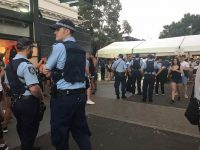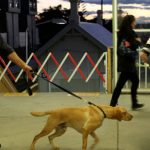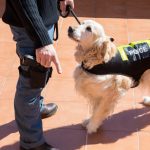Can NSW Police Exclude Patrons Based on a Positive Drug Indication Alone?

There is an enormous amount of evidence to suggest that positive indications by drug detection dogs are not a reliable indicator of the presence of drugs.
Police figures suggest that between two-thirds and eighty percent of positive indications are ‘false’ – meaning the subject does not have drugs on them at the time.
There are also studies which suggest that sniffer dogs make positive indications for reasons other than the presence, or previous presence, of illegal drugs – they may show interest or sit next to a person due to the presence of food, the lingering scent of another dog, upon being signalled by their handler or simply due to tiredness.
Indeed, there is a very strong argument that a positive indication is not enough – by itself – to constitute the ‘reasonable suspicion’ necessary for police officers to conduct a search on a person.
Despite all of this, the NSW Police Force published a statement on its Facebook page yesterday warning that ticket holder to this weekend’s Above and Beyond music festival will be refused entry to the event if they are the subject of a positive indication, regardless of whether drugs are found.
The police statement
The post reads as follows:
“Police are warning patrons attending the ‘Above and Beyond’ music festival at Sydney this weekend that drug detection dogs will be at the venue.
The event will run from 6pm until midnight on Saturday (9 June 2018), at the Sydney Showground.
Police warn that drug detection dogs will patrol the venue and can detect the presence of prohibited drugs or someone who has recently had drugs on them. If a dog makes an indication you will be denied entry.
South West Metropolitan Region Commander, Assistant Commissioner Peter Thurtell said the message from police is simple – don’t bring prohibited drugs to the event.
“These dance parties can be a dangerous environment, particularly when alcohol and illegal drugs are involved.
“We all know there is no quality control in the production of illicit drugs and you are putting your life at risk.
“Police will exclude any person from the venue that the drug dog indicates has or who has recently had drugs on them, regardless of whether drugs are located.
“Quite simply, if you handle or use drugs you will not be permitted to remain at the venue.
“We encourage young people to come along and enjoy the event, we don’t want bad behaviour to spoil the atmosphere or create an unsafe environment.
“Poor choices can have serious consequences and we urge all people attending this festival to remain safe, look after your friends, and don’t risk your health or your good reputation”.
Public backlash
The warning has created a social media storm, with members of the public accusing the force of abusing its powers by proposing to deny entry without sufficient evidence of an offence having been committed.
The vast majority of the 2,500 or so comments on the post are highly critical of the proposal, repeatedly pointing out that patrons who have paid significant amounts of money for tickets and travel to this Saturday’s event may be turned away without having done anything wrong.
Legality
Police have not indicated the source of their supposed power to refuse entry in the absence of conduct or a state of affairs covered by legislation such as the Liquor Act 2007 and Law Enforcement (Powers and Responsibilities) Act 2002 (NSW) (the LEPRA).
Under section 77(2) of the Liquor Act, “authorised persons” such as licensees, their staff and police officers can refuse entry to a patron who is “intoxicated”, “violent”, “quarrelsome” or “disorderly”, or “who uses, or has in his or her possession, while on the premises any substance that the authorised person suspects of being a prohibited plant or prohibited drug”.
There is a strong argument the provisions do not encompass the situation contemplated by police.
As the name suggests, the LEPRA confers powers and responsibilities upon police officers in NSW.
It contains provisions relating to requiring identification, searching and seizing, public disorders and safety, arrests, giving directions, drug detention operations, detention of intoxicated persons, confiscation of items and so on.
None of these powers allow for the course proposed by police in their statement.
Part 14 of the LEPRA (sections 197 – 200A) outlines police powers when it comes to giving directions to members of the public.
Section 197 provides that:
(1) A police officer may give a direction to a person in a public place if the police officer believes on reasonable grounds that the person’s behaviour or presence in the place:
(a) is obstructing another person or persons or traffic, or
(b) constitutes harassment or intimidation of another person or persons, or
(c) is causing or likely to cause fear to another person or persons, so long as the relevant conduct would be such as to cause fear to a person of reasonable firmness, or
(d) is for the purpose of unlawfully supplying or intending to unlawfully supply or soliciting another person or persons to unlawfully supply any prohibited drug, or
(e) is for the purpose of obtaining, procuring or purchasing any prohibited drug that it would be unlawful for the person to possess.
(2) A direction given by a police officer under this section must be reasonable in the circumstances for the purpose of:
(a) reducing or eliminating the obstruction, harassment, intimidation or fear, or
(b) stopping the supply or soliciting to supply of the prohibited drug, or
(c) stopping the obtaining, procuring or purchasing of the prohibited drug.
Although a music festival is a ‘public place’ for the purposes of the act, the situation where a person merely returns a positive indication without any evidence of drugs being present would not amount to the conduct required to justify a direction to move on.
Part 6B of the LEPRA (section 87P – 87ZC) relates to what are known as ‘public safety orders’.
Section 87Q defines a public safety order as:
“an order made by a senior police officer that prohibits a specified person (or persons belonging to a specified class of persons) from:
(a) attending a specified public event (including entering, or being present at, premises being used in connection with the public event), or
(b) entering, or being present at, specified premises or other specified area at any time during a specified period.
This might seem to apply to the proposed prohibition on persons who are the subject of a positive indication by a sniffer dogs. However, section 87R requires that such an order can only be made if there is a “serious risk to public safety or security” and the making of the order is “reasonably necessary in the circumstances”.
A “serious risk to public safety or security” is defined as where the presence of the person or persons might result in:
(a) the death of, or serious physical harm to, a person, or
(b) serious damage to property.
Clearly, the situation where a person may have had drugs on them at a previous time would not qualify.
Provisions in the LEPRA relating to drug detection and search and seizure do not apply.
Apart from the Liquor Act and LEPRA, the common law provides licensees and organisers of events and their agents with a general power to exclude people by revoking their implied licence to enter. That power is subject to the provisions of the Anti-Discrimination Act 1977 (NSW), which prohibits discrimination based on personal attributes such as sex and race in certain contexts, including public places such as festivals, pubs and clubs.
However, there is no indication so far that police will be acting as agents for the organisers of the upcoming festival.





